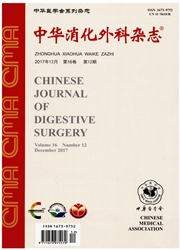

 中文摘要:
中文摘要:
目的 应用磁压榨吻合的原理,探索一种新的肠漏一期修补的方法.方法 将24只犬在距Treitz韧带50、100 cm处空肠分别横行切开肠壁约1 cm,建立犬高位、多处肠漏模型,按随机数字表法分为实验组和对照组,每组12只,观察犬肠漏模型的建立情况.肠漏形成48 h后,实验组采用磁通量为2500 G的钕铁硼磁环原位压榨修补漏口,对照组采用丝线缝合修补漏口.观察犬的一般情况,测吻合口渗漏压,肉眼观察吻合口情况并切取吻合口组织行HE和Masson染色,实验组加行X线检查观察磁环位置并记录磁环排出体外的时间.采用两样本t检验分析检测结果.结果 肠漏模型建立48 h后出现严重的腹腔感染.实验组犬肠漏修补全部获得成功,动物能长期存活,磁环在肠漏修补术后6~7 d排出体外;对照组犬存活8只.肠漏修补术后7 d,实验组与对照组犬吻合口渗漏压分别为(134±23)mm Hg(1 mm Hg=0.133 kPa)和(91±18)mm Hg,两组比较,差异有统计学意义(t=3.225,P<0.05);肠漏修补术后14 d,实验组与对照组犬吻合口渗漏压分别为(281±7)mm Hg和(271±21)mm Hg,两组比较,差异无统计学意义(t=0.988,P>0.05).磁环原位压榨修补后肠道的浆肌层和黏膜层愈合良好,吻合口周围炎症反应轻微,胶原纤维含量少,瘢痕增生不明显.结论 在腹腔感染状态下,应用磁通量为2500 G的磁环对犬肠漏进行一期修补是安全可靠的.
 英文摘要:
英文摘要:
Objective To explore a new method for one-stage repair of the intestinal leakage based on the principle of magnetic compression anastomosis. Methods Twenty-four dogs were randomly divided into experimental group (n = 12) and control group (n = 12) according to random number table. The model of upper and multiple intestinal leakages was established by making transverse incisions of 1 cm in length on the jejunum wall about 50 cm and 100 cm away from the Treitz ligament. Forty-eight hours later, two NdFeB magnetic rings with the magnetic flux of 2500 G were put into the intestine from the leak sites. The leak sites were pressed between the two rings. The ventages in the control group were sutured. The condition of the dogs was observed after the repair of the leakage. The excreting time was recorded, and the leakage pressures of the anastomotic stoma were detected.The positions of the magnetic rings in the experimental group were detected by X ray. Tissues of the anastomotic stoma were processed by hematoxylin eosin and Masson staining. All data were analyzed using the two-sample t test. Results Severe abdominal infection occurred 48 hours after the establishment of the model. All the intestinal leakages in the experimental group were successfully repaired and the dogs survived for a long time. The magnetic rings were excreted six or seven days after the repair. Eight dogs of the control group survived. The leakage pressure of the anastomotic stoma seven days after the repair was (134 ±23)mm Hg (1 mm Hg =0. 133 kPa) in the experimental group and (91 ± 18)mm Hg in the control group, respectively, with a significant difference between the two groups (t = 3.225, P 〈 0.05). The leakage pressure of the anastomotic stoma 14 days after the repair was (281 ±7)mm Hg in the experimental group and (271 ±21) mm Hg in the control group, respectively, with no significant difference between the two groups (t =0. 988, P 〉 0.05). Histological observation showed that after the magnetic comp
 同期刊论文项目
同期刊论文项目
 同项目期刊论文
同项目期刊论文
 期刊信息
期刊信息
